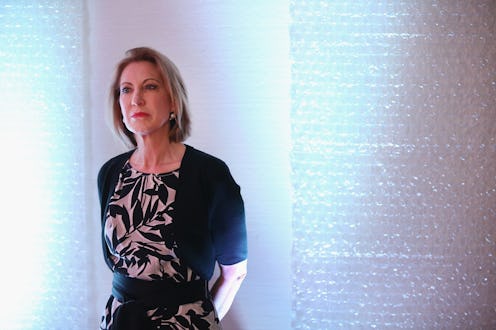News
Carly Fiorina's Career Since Hewlett-Packard
The first female Republican to join the 2016 race has one distinct advantage that sets her apart from her competition. Carly Fiorina was the CEO of Hewlett-Packard for six years, a tenure that she cites as giving her a unique perspective on the economy. But that tenure ended almost 10 years ago; what has the former tech exec been up to since then? Fiorina's career since leaving HP has been filled with board memberships, a troubled enterprise under her own name, and an ambitious Senate run. Regardless of the ups and downs, Fiorina's post-HP journey has undoubtedly helped pave the way to her presidential run.
On Monday morning, Fiorina made her announcement on Good Morning America by saying:
Yes, I am running. I think I'm the best person for the job because I understand how the economy actually works. I understand the world, who's in it, how the world works.
Fiorina is carving out a campaign that will galvanize voters to look outside of the career politicians and consider a leader from outside the usual circle. Her official website states:
Our founders never intended us to have a professional political class. They believed that citizens and leaders needed to step forward.
Fiorina is exemplary of a citizen leader. As CEO of HP, she became the first woman to lead a Fortune 50 company. And according to her website, she doubled revenues, quadrupled cash-flow, and tripled the number of patents per day at HP, which the site notes went from the 28th to the 11th biggest company in the U.S. under her leadership.
In February, Fiorina told CNN that she hoped to parlay her success at HP into a successful presidency.
HP requires executive decision-making, and the presidency is all about executive decision-making.
Perhaps her most notable contribution at HP, Fiorina orchestrated a merger with competitor Compaq in 2002, a move that board members heavily resisted. Fiorina went ahead anyway, prompting members of the Hewlett Packard family to publicly criticize her. In 2005, after the company's performance declined, Fiorina was forced to resign.
Here's what she's been up to since then.
Tough Choices
Following her resignation, Fiorina wrote and published her autobiography, Tough Choices , which reveals her views on leadership, women in business, and the tech world through the story of her own tumultuous career at HP. The book made The New York Times' bestsellers list.
Numerous Board Memberships
After her resignation, Fiorina was named to numerous corporate boards, including Kellogg Co., Merck & Co, Revolution Health Group, Cybertrust, and the Taiwan Semiconductor Manufacturing Company. She was also named to the board of trustees of the Massachusetts Institute of Technology and the Foundation Board of the World Economic Forum. Then in 2012, Fiorina became chair of Good360, a Virginia nonprofit that donates excess merchandise to charities. The same year, Virginia Governor Bob McDonnell appointed her to the James Madison University Board of Visitors.
Carly Fiorina Enterprises & Fiorina Foundation
Shortly before her Senate run in 2010, Fiorina started calling herself the CEO of her own company, Carly Fiorina Enterprises, and charitable organization, Fiorina Foundation. However, a San Francisco Chronicle investigation revealed that she never registered her business in the state of California, nor did she register her foundation with the Internal Revenue Service, prompting many to question the legitimacy of her companies.
Unlocking Potential Project
In 2014, Fiorina launched the Unlocking Potential Project, a five-state initiative that gets women in the political process "by focusing on personal interactions with voters and going beyond the traditional methods of identifying, persuading and turning-out voters." According to its site, the project is a grassroots operation that will "train activists, deploy field staff, and utilize the best technologies to identify, persuade and turnout voters in 2014."
John McCain's 2008 Campaign
Fiorina forayed into politics by working on Senator John McCain's presidential campaign starting in 2006. She would eventually become the point person in his campaign on issues related to business. On March 7, 2008, she was appointed to the fundraising chair for the Republican National Convention's "Victory" initiative. There was even talk of McCain electing her as his running mate, a position she neither fought for nor rejected.
2010 Senate Election
On Nov. 4, 2009, Fiorina announced her candidacy in the 2010 Senate race against incumbent Senator Barbara Boxer. Boxer used Fiorina's shortcomings at HP and her socially conservative stance (Fiorina is pro-life) against her during the campaign. Though she was able to win the Republican primary, Fiorina ultimately lost out to Boxer in what Politico called the "closest match of Boxer's career."
Images: Getty Images (7)
